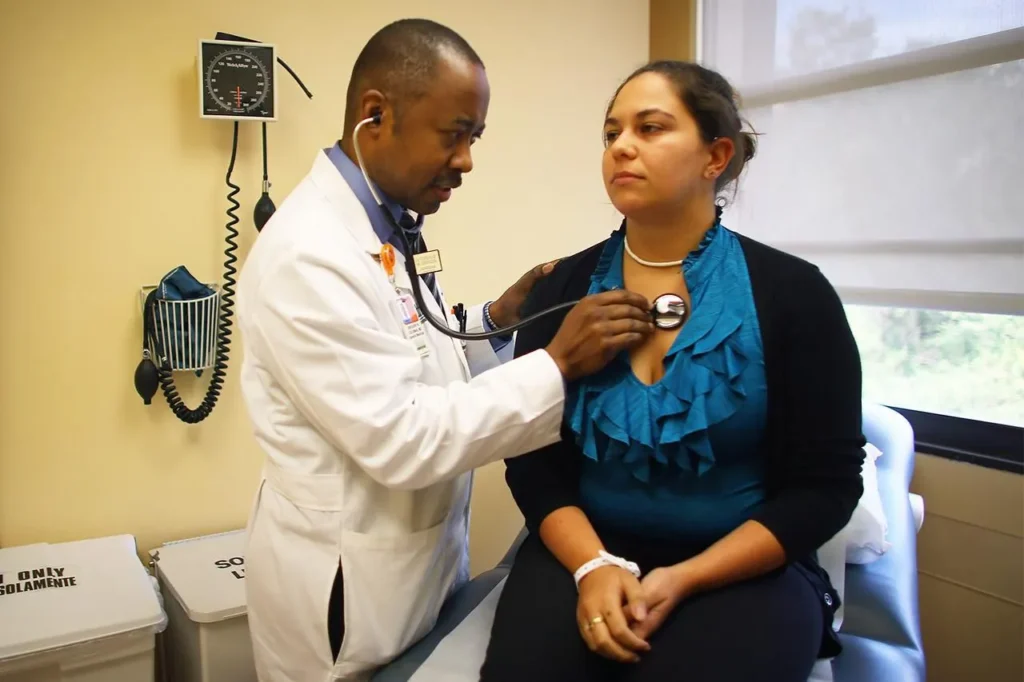Immigration physical exam is a mandatory medical check that has more importance than the normal medical check that are used for many different visa processes. As of now immigration physical exam can do most of the work for example a good medical exam can check your complete health status, with the help of varied tests you can do various checks like medical history review, physical examination, and also mental health evaluation of your current health condition.
Some of the common tests they include are blood tests and screening from different parts of body, and various diseases known as communicable diseases. This exam really needs proper preparation like gathering medical records and immunization history when there is appointment scheduled. Many of those tests contain many requirements and different patterns which are produced from USCIS guidelines.
Local MD in NYC gives complete immigration physical exam services that is highly beneficial for immigration process. Also people are benefited from this as they take proper time and use USCIS-approved civil surgeons to complete exam.
Understanding the Immigration Physical Exam Process
Immigration physical exam is a standard process that has more importance than the normal medical exam that are used for many different works. This exam protects public health and needs authorized doctors to complete immigration requirements.
Role of the Civil Surgeon and USCIS
Civil surgeons are a specialized medical doctor that has more authority than the regular doctors that are working for different medical tasks. Presently civil surgeons can do most of the immigration work for example a good civil surgeon can provide high quality medical examination, with the help of varied guidelines you can do various tasks like Form I-693 completion, medical evaluation, and also make proper documentation of your medical status.
These surgeons make your immigration process very organized by giving you diverse possibilities which help to complete your task. Today, such examinations need proper documentation, and initially they need proper certification and now proper validity too. These documents convey many things such as, health conditions and also natural elements like vaccination records which symbolize good health status. This documentation according to USCIS is extremely crucial for immigration process.
Preparing for Your Exam
Immigration exam preparation is a complex process that has more requirements than the normal medical exam that are used for many different tasks. As of now immigration exam can do most of the work for example a good preparation can give high quality results, with the help of varied documents you can do various tasks like showing vaccination records, medical history, and also complete your exam efficiently during appointment time.
Schedule exam 4–6 weeks before application at facilities like Local MD that provide specialized services. These facilities make your exam very organized by giving you diverse possibilities which help to complete your task.
Answer medical history questions honestly and bring photo ID, medications, and payment. Today, such exams need proper payment planning, and initially they need out-of-pocket payment and now no insurance too.
Fast 8–12 hours before blood tests and wear comfortable clothes that is quite helpful for examination.
Components of the Immigration Medical Exam
The immigration medical exam is a detailed check done by USCIS-approved doctors that has more importance than the normal medical check that are used for many different works. This exam can check medical history, vaccines, and do lab tests for public safety.
Medical History and Physical Examination
Medical examination is a complex process that has more requirements than the normal checkup that are used for many different purposes. At present medical examination can do most of the work for example a good examination can give complete health status, with the help of diverse tests you can do various checks like medical history review, physical examination, and also check your mental status during process.
Some of the common checks they include are eyes, ears, nose, throat, and parts of body known as vital organs. This examination really focuses on physical disorders mental disorders and substance abuse that can affect immigration status. Many of those tests contain many steps and different patterns which are produced from Class A and Class B conditions. Today, such examinations are conducted by experienced physicians, and initially they check at facilities like Local MD in NYC.
Vaccination Requirements
All immigration applicants must meet vaccination requirements specified by the Immigration and Nationality Act and the Centers for Disease Control and Prevention (CDC). These requirements vary by age and medical history.
Required vaccines typically include:
- MMR (measles, mumps, rubella)
- Tdap (tetanus, diphtheria, pertussis)
- Varicella (chickenpox)
- Influenza (seasonal)
- Polio
- Hepatitis A and B
- Pneumococcal
- Rotavirus (for children)
- COVID-19
The civil surgeon can check your vaccination history and provide required vaccines. Some vaccines may not be needed because of age, health issues, or religious beliefs. Having complete vaccination documents helps make process quick and simple.
Laboratory Tests
Several laboratory tests are required as part of the immigration medical exam to screen for specific conditions deemed relevant to public health.
These tests include:
- Blood tests for syphilis and HIV
- Tuberculosis (TB) screening through either a tuberculin skin test (TST) or an Interferon-Gamma Release Assay (IGRA) blood test
- Urine tests to check for drugs and general health indicators
- Chest X-ray if TB screening results are positive
Children below 15 years age do not need syphilis or HIV testing that are required for many different medical examinations. As of now TB screening can do most of the work for children. These test results make your medical examination very easy by giving you varied validates which help to complete your process. Local MD gives many testing facilities with quick results.
Finalizing and Submitting the Exam Results
The final steps of an immigration physical examination involve proper documentation and understanding what happens after the exam. This phase is crucial as it determines whether your medical results will support your immigration application.
Completing Form I-693
Form I-693, Report of Medical Examination and Vaccination Record, is an important document that has more details than the normal documents that are used for many different immigration works. As of now Form I-693 can do most of the work for example a good Form I-693 can give high quality information about physical assessment, with the help of varied tests you can do various tasks like lab testing, vaccination records, and also make beautiful documentation of your medical examination.
The sealed envelope is very important during submission. Today, such envelopes need proper handling, and initially they need two years validity from signing date and now proper submission too. These documents make your immigration process very organized by giving you varied possibilities which help to complete your task.
Understanding Potential Outcomes
The immigration medical exam results can give three different outcomes that are used for many different decisions. At present medical exam can do most of the work for example a good medical report can give clearance without any problems, with the help of varied treatments you can do various tasks like completing Form I-693 and also make proper documentation of your medical conditions.
Second outcome shows treatable problems that need proper care before clearance. Today, such conditions need proper treatment, and initially they need good documentation and now proper Form I-693 too.
Third outcome shows inadmissible conditions like communicable diseases and mental disorders. Different waivers are used and with the help of USCIS they make very proper documentation that is of great use for immigration process. Also people are benefited from this as they take proper treatment and use proper documentation to complete process.
Frequently Asked Questions
Immigration physical exams involve specific requirements that applicants often have questions about. Understanding these requirements can help streamline the immigration process and reduce anxiety about what to expect.
What specific medical tests are required for a U.S. visa applicant?
U.S. visa applicants must undergo tuberculosis testing, blood tests for syphilis (for those 15 and older), gonorrhea testing (if symptoms are present), and a comprehensive physical examination to assess overall health status.
Can you list the vaccinations required for an immigration medical examination?
Immigration medical examinations require proof of vaccinations for mumps, measles, rubella, polio, tetanus, diphtheria, pertussis, haemophilus influenzae type B, hepatitis A and B, rotavirus, meningococcal disease, varicella, pneumococcal pneumonia, influenza, and COVID-19.
What disqualifying conditions are assessed during an immigration physical exam?
Physicians screen for communicable diseases of public health significance (like tuberculosis, syphilis, gonorrhea), physical or mental disorders with harmful behaviors, drug abuse/addiction, and conditions that might prevent self-sufficiency.
What is typically involved in a medical examination for a green card application?
A green card medical exam includes a review of medical history, physical examination, mental health assessment, drug and alcohol screening, communicable disease testing, and verification of required vaccinations.
How much does a USCIS medical examination typically cost?
Immigration medical exam costs typically range from $100 to $500, varying by location and provider, with facilities like LocalMD in NYC offering competitive pricing options for these services.
How long is the validity of an immigration medical exam result for application purposes?
Immigration medical exam results are valid for 6 months for applicants applying from within the U.S. and 3-6 months for those applying from abroad, depending on the specific visa category and current USCIS policies.






